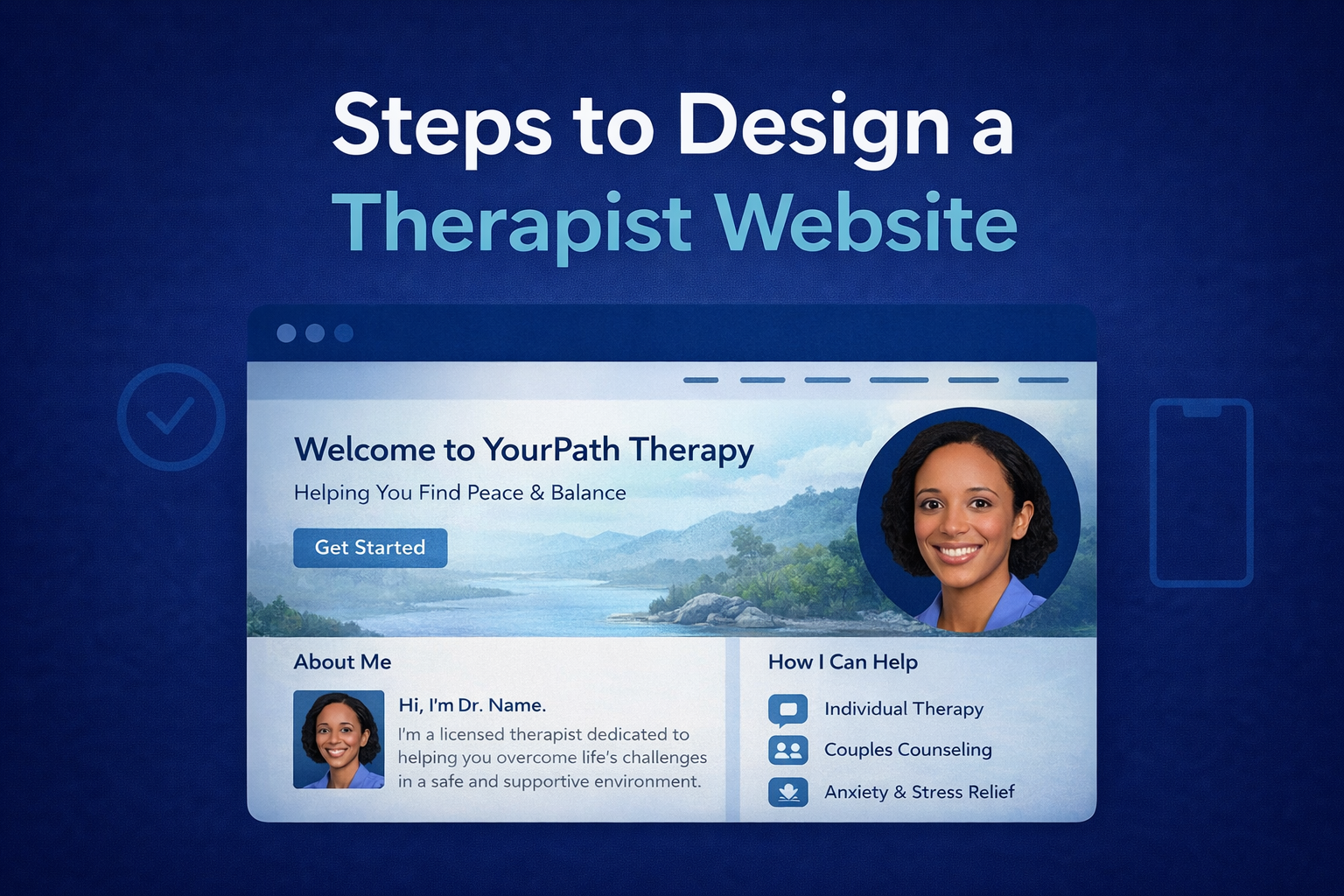Google’s AI-driven search, powered by advanced algorithms like RankBrain and natural language processing (NLP), is transforming how clients find mental health services in 2025. With over 50% of searches now voice-based or conversational, preparing your mental health practice website for AI-driven search is critical to attract high-intent clients, enhance visibility, and ensure compliance with HIPAA.
Why AI-Driven Search Matters for Mental Health Practices
Google’s AI-driven search prioritizes conversational queries, local intent, and user experience, reshaping how clients discover therapy services. Queries like “find a therapist near me for anxiety” or “what is teletherapy in Spanish?” are processed using NLP to deliver precise, context-aware results, often as featured snippets or voice responses. For mental health practices, optimizing for AI search:
- Increases Discoverability: Ranks your website higher for high-intent, conversational queries.
- Enhances Client Engagement: Delivers accessible, relevant content to diverse audiences.
- Boosts Conversions: Drives bookings through seamless, user-friendly experiences.
- Builds Trust: Aligns with E-E-A-T principles to establish credibility and authority.
This guide provides practical steps to prepare your website for AI-driven search success.
Understanding Google’s AI-Driven Search
Google’s AI-driven search leverages NLP, machine learning, and user intent analysis to deliver relevant results. Key features include:
- Conversational Queries: Questions like “What is CBT for depression?” or “Who offers teletherapy in [city]?”
- Local Intent: Prioritizes location-based searches like “therapist near me.”
- Featured Snippets: Provides concise answers for voice assistants, often from “position zero.”
- Multilingual Processing: Supports queries in languages like Spanish, e.g., “terapia en español cerca de mí.”
Optimizing for these features requires technical SEO, content strategy, and compliance with HIPAA regulations.
Strategies to Prepare Your Website for AI-Driven Search
1. Optimize for Conversational Keywords
AI-driven search favors long-tail, question-based queries reflecting client needs. Steps include:
- Research Common Queries: Use tools like AnswerThePublic or SEMrush to identify phrases like “How does therapy help anxiety?” or “Find a therapist in [city] for stress.”
- Incorporate Questions in Headings: Use H2/H3 headings like “What Is Cognitive Behavioral Therapy?” to match voice search patterns.
- Target Local Keywords: Include city or neighborhood names, e.g., “Chicago therapy for depression,” to capture local intent.
For SEO strategies, see voice search SEO for mental health.
2. Implement Structured Data (Schema Markup)
Structured data enhances AI algorithms’ understanding of your website, boosting visibility in voice and text searches. Steps include:
- Use Relevant Schema Types:
- LocalBusiness Schema: Highlights practice name, address, phone number (NAP), and location.
- HealthProfessional Schema: Showcases therapist credentials, specialties, and services.
- FAQ Schema: Answers common questions like “What is teletherapy?” for featured snippets.
- Apply JSON-LD Format: Add schema to your website’s
<head>using tools like Google’s Structured Data Markup Helper. - Test Schema: Use Google’s Rich Results Test to ensure accuracy.
For structured data guidance, explore structured data for voice search.
3. Create Concise, Conversational Content
AI search prioritizes clear, empathetic answers for voice responses. Steps include:
- Provide Brief Answers: Start sections with concise responses (40-60 words) for featured snippets, e.g., “Teletherapy is secure online counseling using HIPAA-compliant video platforms.”
- Use Plain Language: Avoid jargon, explaining terms like “CBT” or “teletherapy” in simple, empathetic terms.
- Include Detailed Follow-Ups: Expand on answers with in-depth sections for clients seeking more information.
Example for “What is therapy like?”:
Answer: Therapy is a safe space to explore your feelings with a licensed professional.
Details: Learn about session structure, therapy types, and how to prepare.
4. Optimize for Mobile and Accessibility
AI searches, especially voice queries, are predominantly mobile-driven and require accessible design. Steps include:
- Use Responsive Design: Ensure websites adapt to all screen sizes using frameworks like Bootstrap.
- Reduce Load Times: Optimize images and use caching for load times under 3 seconds.
- Enhance Accessibility: Add ARIA landmarks, alt text, and voice-activated navigation for clients with disabilities.
For mobile tips, see mobile-friendly websites for psychologists.
5. Support Multilingual Audiences
AI search excels at processing multilingual queries, critical for diverse communities. Steps include:
- Offer Spanish-Language Content: Optimize for queries like “terapia en español cerca de mí” with translated pages.
- Use Professional Translators: Ensure cultural sensitivity and accuracy in multilingual content.
- Integrate Voice Technology: Enable voice-activated forms or chatbots for clients with low tech literacy.
For multilingual strategies, check multilingual therapy websites.
6. Leverage AI-Powered Chatbots
Chatbots enhance client engagement by answering queries in real time, aligning with AI search trends. Steps include:
- Deploy HIPAA-Compliant Chatbots: Use platforms like Dialogflow with signed BAAs to answer FAQs like “What does therapy cost?”
- Train for Conversational Queries: Program chatbots to handle questions like “How do I start teletherapy?”
- Integrate with Website: Embed chatbots on landing pages for instant support.
For chatbot strategies, see chatbots for therapy questions.
7. Enhance Local SEO for AI Search
AI search prioritizes local intent, especially for voice queries. Steps include:
- Optimize Google Business Profile: Ensure accurate NAP, services, and client reviews.
- Use Local Schema: Apply LocalBusiness schema to highlight your practice’s location.
- Target Local Queries: Include phrases like “[city] therapist for anxiety” in content and metadata.
For local SEO tips, explore local SEO for mental health practices.
8. Integrate HIPAA-Compliant Tools
Secure tools drive conversions while maintaining compliance. Steps include:
- Embed Secure Forms: Use HIPAA-compliant intake or consent forms for onboarding.
- Link to Scheduling Tools: Enable direct booking with platforms like SimplePractice.
- Use Secure Payment Gateways: Connect to HIPAA-compliant gateways like Stripe.
For payment insights, see secure payment gateways for mental health clinics.
9. Monitor and Refine Performance
Regular evaluation ensures ongoing success in AI search. Steps include:
- Track AI Search Rankings: Use Google Search Console to monitor performance for conversational and local queries.
- Analyze Conversion Metrics: Track form submissions, bookings, and bounce rates with Google Analytics.
- Update Content and Schema: Refresh FAQs, keywords, and schema based on new client needs or trends.
Benefits of Optimizing for AI-Driven Search
- Increased Visibility: Rank higher in voice and AI-driven searches, reaching high-intent clients.
- Higher Conversions: Drive bookings with clear, actionable content.
- Enhanced Accessibility: Support diverse clients, including those with disabilities or language preferences.
- Improved SEO Performance: Align with Google’s focus on NLP and mobile-first indexing.
- Client Trust: Authoritative, compliant content builds confidence in your practice.
Challenges and Solutions
Challenge: Technical Complexity of Schema and AI Tools
Solution: Partner with healthcare web developers or use free tools like Google’s Structured Data Markup Helper.
Challenge: Keeping Content Current
Solution: Schedule quarterly reviews to update keywords, FAQs, and schema for new trends.
Challenge: Ensuring HIPAA Compliance
Solution: Use platforms with BAAs and encryption, avoiding PHI in public-facing content.
Challenge: Multilingual Content Accuracy
Solution: Hire professional translators and test content with native speakers for cultural relevance.
Ethical Considerations
- Data Privacy: Use HIPAA-compliant tools with encryption and minimal PHI collection.
- Transparency: Disclose data collection and AI usage in privacy policies and consent forms.
- Cultural Sensitivity: Use inclusive, stigma-free language to respect diverse client backgrounds.
- Accessibility: Design for clients with disabilities, offering voice and text-based options.
Tools and Resources for AI-Driven Search Optimization
- SEO Tools: SEMrush, AnswerThePublic for query research.
- Schema Generators: Schema.org, Google’s Structured Data Markup Helper.
- Analytics Platforms: Google Analytics, Search Console for performance tracking.
- Chatbot Platforms: Dialogflow, Tidio for HIPAA-compliant client support.
The Future of AI-Driven Search for Mental Health Practices
Emerging trends will shape optimization strategies:
- Advanced NLP: Improved understanding of complex, emotional queries.
- Voice-Activated Booking: Direct scheduling via voice assistants.
- Multilingual Expansion: Increased focus on languages like Spanish for broader reach.
Proactively adapting ensures your practice remains visible and client-centered.
Conclusion
Preparing your mental health practice website for Google’s AI-driven search requires optimizing for conversational keywords, structured data, and mobile accessibility while ensuring HIPAA compliance. By leveraging AI chatbots, local SEO, and multilingual content, therapists can attract high-intent clients and build trust. Ethical implementation and continuous monitoring ensure long-term success in an AI-driven digital landscape.
For expert assistance in optimizing your website for AI-driven search, explore Mental Health IT Solutions.







